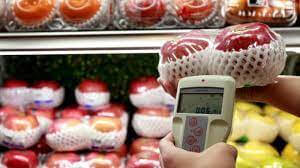All Japanese food shipments from areas affected by the 2011 Fukushima nuclear disaster have passed every single radiation inspection in Taiwan since February, Taiwanese Deputy Health Minister Hsueh Jui-yuan said on Monday.
Hsueh said at a public hearing held by the Legislature’s Social Welfare and Environmental Hygiene Committee that food imports from Fukushima and four other nearby prefectures had been inspected batch-by-batch at the Taiwan border for radioactive residue since February 21, when Taiwan lifted its ban on Japanese food imports from Fukushima and surrounding areas after 11 years.
He noted that as of May 13, around 180 shipments of food products have arrived in Taiwan from the five prefectures, revealing that not one of them was found to contain excessive levels of nuclear radioactivity. The minister added, however, that 22 batches of food imports from the aforementioned areas had failed to pass inspections due to reasons unrelated to radioactive contamination. One shipment of strawberries, for instance, contained high levels of pesticide, while the 21 other batches of food imports were rejected because they failed to meet Taiwan’s standards for Chinese language labelling, he said.
This will also leave China and South Korea as the remaining two countries that still maintain an import ban on Japanese food products from areas stricken by the 2011 disaster. (3/3)
— Tingting Liu 劉亭廷 (@tingtingliuTVBS) February 8, 2022
Following the Fukushima Daiichi Nuclear Power Plant disaster in March 2011, Taiwan banned food imports from the Japanese prefectures of Fukushima, Ibaraki, Tochigi, Gunma, and Chiba. However, this February, the self-governing island’s government lifted the ban on all food products from the delisted areas, with the exception of mushrooms, wild animal meat, and some other items. Taipei set out specific conditional measures, including proof of radiation testing and product origin, as well as batch-by-batch border inspections of food imports from the listed prefectures.
Meanwhile, the Japanese government announced last April that it had unilaterally decided to release almost 1.25 million tons of treated radioactive wastewater that was contaminated during the Fukushima meltdown into the Pacific Ocean, as the 1.37 million tons storage capacity of tanks on the Tokyo Electric Power Company (TEPCO) facility are expected to be exhausted by this fall. The gradual release is expected to take decades to finish.
#Taiwan will lift the blanket ban on food imports from #Japan's #Fukushima and surrounding areas. The changes are based on scientific evidence and made to keep with international standards on food security.
— 民主進步黨 Democratic Progressive Party (@DPPonline) February 8, 2022
Japan has repeatedly insisted that the plan is safe, that it has acquired approval from the International Atomic Energy Agency (IAEA), and that it will continue to maintain transparency throughout the process, fishing industries and foreign governments remain sceptical of the associated health risks with the release. Japan’s Ministry for Economy, Trade and Industry (METI) has further argued that the radioactive water has been treated utilising an advanced liquid processing system to remove all contaminants below environmental levels but needs to be re-filtered to remove harmful isotopes. Further, it will be significantly diluted to meet international standards before it is released into the ocean.
However, despite the precautions, Tokyo’s decision was met with anxiousness. Following the announcement, several maritime neighbours and environmental groups swiftly expressed concern and condemnation, including China, which has usually remained unperturbed on such issues in the past. This February, a United Nations nuclear task force promised to prioritise safety as it launched a review of Tokyo’s controversial plans. However, concern surrounding the plan has continued to prevent the country from releasing its wastewater yet.
Furthermore, Japan announced just this week that it is lifting an evacuation order on the village of Kasurao on June 12, whereby those who used to live in the village prior to the 2011 Fukushima disaster can return home.

